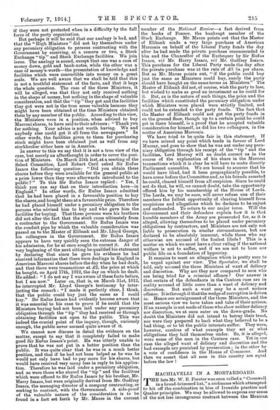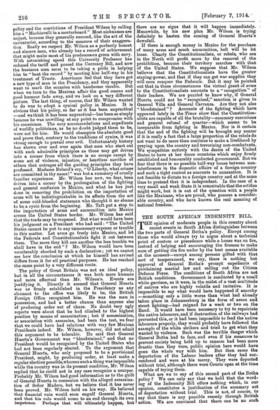MACHIAVELLI IN A MORTARBOARD.
THE late Mr. W. E. Forster was once called a " Cromwell in a broad-brimmed hat," a nickname which attempted to hit off the combination in him of Ironside practice and Quaker principles. We may be allowed to express our sense of the not lees incongruous contrast between the Mexican policy and the convictions of President Wilson by calling him a "Machiavelli in a mortarboard." Most nicknames are unjust, because they generally succeed, like the art of the caricaturist, according to the measure of their exaggera- tion. Really we respect Mr. Wilson as a perfectly honest and sincere man, who already has a record of achievement that might make most of his predecessors green with envy. With astonishing speed this University Professor has reduced the tariff and passed the Currency Bill, and now the business men seem to be taking a pride in helping him to "beat the record" by meeting him half-way in his treatment of Trusts. Americans feel that they have got a new type of man in the Presidency, and they apparently want to mark the occasion with handsome results. But when we turn to the Mexican affair the good omens and good humour fade away, and we look on a very different picture. The last thing, of course, that Mr. Wilson wanted to do was to adopt a cynical policy in Mexico. It is obvious that his policy, so far as it has been unpractical —and we think it has been unpractical—has been so simply because he was unwilling at any point to compromise with his conscience. The easy accommodations and expedients of worldly politicians, as he no doubt judged them to be, were not for him. He would champion the absolute good and prove that, contrary to the traditions of cynics, it was strong enough to prevail over evil. Unfortunately history has shown over and over again that men who start out with such admirable principles as these may get driven into a corner from which there is no escape except by some act of violence, injustice, or heartless sacrifice of others that outrages all the guiding principles they have professed. Madame Roland's cry, " 0 Liberty, what crimes are committed in thy name!" was but a summary of cruelly familiar experience. Mr. Wilson has now, we fear, been driven into a corner by the prolongation of the fighting and general confusion in Mexico, and what he has just done in removing the prohibition on the importation of arms will be indistinguishable in its effects from the act of some cold-blooded statesman who thought it no shame to be a cynic from the beginning. Mr. Taft put a stop to the importation of arms and ammunition into Mexico across the United States border. Mr. Wilson has said that the trade may be reopened. But what would have been his judgment on a President who had said : "The United States cannot be put to any unnecessary expense or trouble in this matter. Let arms go freely into Mexico, and let the Federals and Constitutionalists fight it out between them. The more they kill one another the less trouble we shall have in the end " ? Mr. Wilson would have been unutterably shocked by such a declaration ; yet we cannot see how the conclusion at which he himself has arrived differs from it for all practical purposes. He has reached the same point by a very different route.
The policy of Great Britain was not an ideal policy, but in all the circumstances it was both more humane and more effectual than Mr. Wilson's. Events are justifying it. Directly it seemed that General Huerta was as firmly established in the Presidency as any claimant to the office was likely to be, the British Foreign Office recognized him. He was the man in possession, and had a better chance than anyone else of producing order out of chaos. No doubt very ugly reports were about that he had climbed to the highest position by means of assassination ; but if assassination, or association with assassins, had been the test, we fear that we could have had relations with very few Mexican Presidents indeed. Mr. Wilson, however, did not admit this argument to be tolerable. He said that General Nuerta's Government was "bloodstained," and that no President would be recognized by the United States who had not been regularly elected. To the argument that General Huerta, who only proposed to be a provisional President, might, by producing order, at least make a regular election possible,whereas such a thing was impossible while the country was in its present condition, Mr. Wilson replied that he could not in any case recognize a usurper. Probably Mr. Wilson had good information as to the guilt of General Huerta in connexion with the alleged assassina- tion of Senor Madero, but we believe that it has never been proved. Mr. Wilson held on his way. He believed that financial ruin would soon engulf General Huerta, and that his rule would come to an end through its own impotence. Perhaps that will ultimately happen, but there are no signs that it will happen immediately. Meanwhile, by his new plan Mr. Wilson is trying definitely to hasten the coming of General Huerta's downfall.
If there is enough money in Mexico for the purchase of many arms and much ammunition, bell will be let loose. Clearly the Constitutionalists, or rebels, who are in the North will profit more by the removal of the prohibition, because their territory marches with that of the United States. We suppose that Mr. Wilson believes that the Constitutionalists have the greater staying-power, and that if they can get war supplies they will soon conquer the Federate. But it may be pointed out that in these circumstances the virtual grant of arms to the Constitutionalists amounts to a " recognition" of their leaders. We are puzzled to know why, if General Huerta could not be " recognized," sanction is given to General Villa and General Carranza. Are they not also " bloodstained " ? Accounts of the fighting which have appeared lately in the Times show that the Constitution- alists are capable of all the brutality—summary executions and general refusal of quarter—which seems to be inseparable from fighting in Mexico. Nor is it certain that the end of the fighting will be brought any nearer if it is really a fact that a large proportion of the rebels do not want to do more than continue to make a livelihood by preying upon the country and terrorizing non-combatants. We sympathize entirely with the desire of the United States to have at her doors countries which enjoy firmly established and honourably conducted government. But we fear that there is no possible half-way house between non- interference in the domestic affairs of a foreign country and such a tight control as amounts to annexation. It is not feasible to dictate to a foreign country and at the same time to pretend that it is independent. In the case of a very small and weak State it is conceivable that the artifice might work, but it is out of the question with a people like the Mexicans, who are proud, who possess a consider- able country, and who have known the real meaning of national freedom.











































 Previous page
Previous page